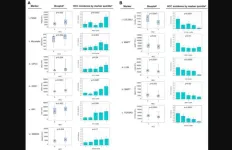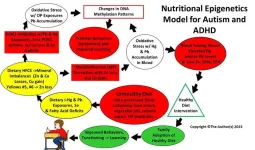(Press-News.org) New test for improving population-based colorectal cancer screening
A new stool test appears to detect colorectal cancer precursors better than the current test. This could further reduce the number of new colorectal cancer cases as well as the number of people dying from the disease. A study led by the Netherlands Cancer Institute compared both tests. The results are published today in The Lancet Oncology.
Each year worldwide, approximately 1.9 million people are diagnosed with colorectal cancer, and 935,000 people lose their lives as a result of the condition. If detected early, colorectal cancer is curable. However, by the time symptoms such as weight loss or blood in the stool appear, it is often too late. That is why many countries have introduced population-based screening programs. In The Netherlands, for example, people between the ages of 55 and 75 are invited to be tested every two years.
Most population-wide screening programs use the fecal immunochemical test (FIT), a stool test that measures the presence of the blood protein hemoglobin. Worldwide, colorectal cancer screening programs have proven to be successful in diagnosing colorectal cancer at earlier stages and reducing colorectal cancer mortality.
Three proteins
"The current test performs well, but leaves room for improvement," says Gerrit Meijer, principle investigator at the Netherlands Cancer Institute. "We want to be able to detect the tumors before they have become invasive, that is at the stage of larger premalignant polyps. Treating physicians then can remove these polyps during a colonoscopy, rather than by surgery."
Meijer and his colleagues at the Netherlands Cancer Institute, the Amsterdam UMC and Erasmus MC have been working on a new test for years. This multitargetFIT-test (mtFIT) measures hemoglobin and two additional proteins. An earlier retrospective study demonstrated promising results.
Cancer precursors
Today, the researchers published the results of a much larger, prospective study that compared the mtFIT to the current FIT in over 13,000 participants of the Dutch national population-based screening program. The study was a success. "The new test can detect cancer precursors more effectively," Meijer explains. "Our results predict that the test can reduce the number of new cases of colorectal cancer and mortality resulting from it." For participants, the new test is just as easy to use as the current test.
More true-positive results
The new test yielded more positive results than the current test. While this led to more colonoscopies, with the new mtFIT test doctors found abnormalities in 299 persons, compared to 159 persons with the current FIT test. This difference mainly concerned persons with a high-risk precursor of colon cancer (216 versus 114). Meijer: "The new test detects more larger polyps without a significant increase in 'false-positive' results and thus unnecessary colonoscopies."
The exact number of colorectal cancer cases that could be prevented with this new test depends on the way the current FIT test is used in different countries. Meijer: "The Dutch screening program applies a relatively high cutoff value to consider the FIT test positive, meaning unfavorable. Here, the new mtFIT test could lead to 21% fewer cases of colorectal cancer and 18% fewer mortalities. In countries that already use a lower FIT cutoff value these figures would be lower, but likely at least 5% fewer people would develop colorectal cancer, with at least 4% fewer mortalities. In both scenarios, the new test could be cost-effective." Implementation of mtFIT in existing FIT-based screening programs will be relatively easy because both tests basically require the same screening logistics.
Screening program
"This is exceptionally good news," says Meijer. The new test cannot replace the current population screening test just yet. "The critical next step is to produce the test at an industrial scale according to European diagnostic test guidelines. To this end we founded the company CRCbioscreen, to enable the test to benefit CRC screening participants in the Netherlands and beyond."
This study was financially supported by KWF Dutch Cancer Society, Health Holland, Maag Lever Darm Stichting, Stand Up To Cancer (SU2C) and CRCbioscreen (supported by The Mark Foundation for Cancer Research and Human+)
END
New test for improving population-based colorectal cancer screening
A new stool test appears to detect colorectal cancer precursors better than the current (FIT) test, a study led by the Netherlands Cancer Institute shows.
2024-02-10
ELSE PRESS RELEASES FROM THIS DATE:
Quitting smoking at any age brings big health benefits, fast: study
2024-02-09
People who quit smoking see major gains in life expectancy after just a few years, according to a new study by University of Toronto researchers at Unity Health Toronto.
The study, published in NEJM Evidence, shows that smokers who quit smoking before age 40 can expect to live almost as long as those who never smoked. Those who quit at any age return close to never-smoker survival 10 years after quitting, and about half that benefit occurs within just three years.
“Quitting smoking is ridiculously effective in reducing ...
Discoveries can be used to optimize production of annatto powder
2024-02-09
Researchers at the University of São Paulo’s Luiz de Queiroz College of Agriculture (ESALQ-USP) and the Federal University of Viçosa (UFV) in Brazil have shown for the first time that bixin or annatto powder, a carotenoid pigment extracted from the seeds of the achiote or annatto tree (Bixa orellana), is not produced only in the seeds but also in other organs, and that the process intensifies in the plant’s adult phase.
An article on the study published in the Journal of Experimental Botany, also describes genetic modifications in the species that can optimize production of the pigment, which is widely used in the food ...
Harnessing human evolution to advance precision medicine
2024-02-09
Humans are still evolving, and Tatum Simonson, PhD, founder and co-director of the Center for Physiological Genomics of Low Oxygen at University of California School of Medicine, plans to use evolution to improve healthcare for all.
Her latest research, which was published February 9, 2024 in Science Advances, reveals that a gene variant in some Andean people is associated with reduced red blood cell count at high altitude, enabling them to safely live high in the mountains in low-oxygen conditions. Simonson’s UC San Diego lab is applying those findings toward understanding whether there may be a genetic component ...
For Black patients, 'representation matters' in evaluating prostate cancer websites
2024-02-09
Waltham — February 9, 2024 — For Black men with prostate cancer, racial representation is a key factor affecting trust in websites offering information on prostate cancer, reports a study in the March issue of The Journal of Urology®, an Official Journal of the American Urological Association (AUA). The journal is published in the Lippincott portfolio by Wolters Kluwer.
"Our study shows that representation matters to Black patients seeking prostate cancer information online," comments lead author Stacy Loeb, MD, MSc, PhD (Hon), of New York University Langone Health. "Not only does it impact trust in the information, but a lack ...
Having COVID-19 and Long COVID can impact women’s sex lives
2024-02-09
From work to school to socializing, COVID-19 has impacted just about every part of our lives—and now Boston University research has shown that also includes what happens in the bedroom. A study of more than 2,000 cisgender women found the coronavirus disease can impair sexual function, with long COVID having an especially detrimental effect.
“If you’re sick with COVID, you’re probably less interested in sex and maybe your body is less prepared to have sex,” says Amelia M. Stanton, a BU College of Arts & Sciences assistant ...
Mechanistically based blood proteomic markers in the TGF-β pathway stratify risk of HCC in patients with cirrhosis
2024-02-09
“A fundamental hypothesis we sought to test was whether biomarkers from the TGF-β signaling pathway might be of novel value in risk stratification of HCC in the clinical cirrhotic setting.”
BUFFALO, NY- February 9, 2024 – A new research paper was published in Genes & Cancer on February 5, 2023, entitled, “Mechanistically based blood proteomic markers in the TGF-β pathway stratify risk of hepatocellular cancer in patients with cirrhosis.”
Hepatocellular carcinoma (HCC) is the third leading cause of death from cancer worldwide but is often diagnosed at an advanced incurable stage. Yet, despite the urgent need for ...
Speed baiting: new report offers strategy for increasingly crowded Utah fishing
2024-02-09
There may, as they say, be plenty of fish in the sea — but angling opportunities on Utah’s streams, rivers and lakes are getting more crowded.
The number of anglers trying their luck on Utah waters has consistently increased over the years, meanwhile it’s getting more expensive for state managers to raise and stock gamefish and increasingly difficult to access water-based recreation during the ongoing megadrought.
Managers of fisheries in the state are being asked to do more with less these days, and they’re working more strategically to create sustainable opportunities for everyone picking up a rod and ...
Blocking artery supplying the brain covering after subdural hematoma reduced repeat surgery
2024-02-09
Research Highlights:
In the EMBOLISE clinical trial, obstructing (or blocking) an artery that supplies blood to the dura, the protective covering of the brain, along with surgery to remove pooled blood reduced the chances by nearly 3-fold that blood would reaccumulate and require additional surgery. According to researchers, complications related to the embolization procedure were low, and neurological function was comparable to those without embolization.
Chronic subdural hematoma, a pooling of blood between the brain and one of its outer coverings, is one ...
Robotic-assisted surgery and navigation don't affect infection risk after hip arthroplasty
2024-02-09
Waltham — February 8, 2024 — For patients undergoing total hip arthroplasty (THA), the use of robotic-assisted surgery and surgical navigation techniques is not associated with an increased risk of periprosthetic joint infection (PJI), suggests a study in The Journal of Bone & Joint Surgery. The journal is published in the Lippincott portfolio by Wolters Kluwer.
Computer navigation (CN) and robotic assistance (RA) do not alter the risk of PJI after total hip replacement surgery, according to the new research by Alberto V. Carli, MD, and colleagues of Hospital for Special Surgery, New York.
Could CN and RA increase risks during hip replacement?
Computer ...
New study shows nutritional epigenetics education improves diet and attitude in parents of children with autism and ADHD
2024-02-09
In a recent publication released by PubMed, American scientists led by Dr. Dufault at the Food Ingredient and Health Research Institute, reported the results of a clinical trial in which parents who received nutritional epigenetics education significantly reduced their consumption of ultra-processed foods while increasing their intake of whole and/or organic foods. The education intervention used curriculum focused on the constructs of the nutritional epigenetics model that explains how autism and attention deficit/hyperactivity disorder (ADHD) may develop from the excess consumption of ultra-processed ...
LAST 30 PRESS RELEASES:
New knowledge on heritability paves the way for better treatment of people with chronic inflammatory bowel disease
Under the Lens: Microbiologists Nicola Holden and Gil Domingue weigh in on the raw milk debate
Science reveals why you can’t resist a snack – even when you’re full
Kidney cancer study finds belzutifan plus pembrolizumab post-surgery helps patients at high risk for relapse stay cancer-free longer
Alkali cation effects in electrochemical carbon dioxide reduction
Test platforms for charging wireless cars now fit on a bench
$3 million NIH grant funds national study of Medicare Advantage’s benefit expansion into social supports
Amplified Sciences achieves CAP accreditation for cutting-edge diagnostic lab
Fred Hutch announces 12 recipients of the annual Harold M. Weintraub Graduate Student Award
Native forest litter helps rebuild soil life in post-mining landscapes
Mountain soils in arid regions may emit more greenhouse gas as climate shifts, new study finds
Pairing biochar with other soil amendments could unlock stronger gains in soil health
Why do we get a skip in our step when we’re happy? Thank dopamine
UC Irvine scientists uncover cellular mechanism behind muscle repair
Platform to map living brain noninvasively takes next big step
Stress-testing the Cascadia Subduction Zone reveals variability that could impact how earthquakes spread
We may be underestimating the true carbon cost of northern wildfires
Blood test predicts which bladder cancer patients may safely skip surgery
Kennesaw State's Vijay Anand honored as National Academy of Inventors Senior Member
Recovery from whaling reveals the role of age in Humpback reproduction
Can the canny tick help prevent disease like MS and cancer?
Newcomer children show lower rates of emergency department use for non‑urgent conditions, study finds
Cognitive and neuropsychiatric function in former American football players
From trash to climate tech: rubber gloves find new life as carbon capturers materials
A step towards needed treatments for hantaviruses in new molecular map
Boys are more motivated, while girls are more compassionate?
Study identifies opposing roles for IL6 and IL6R in long-term mortality
AI accurately spots medical disorder from privacy-conscious hand images
Transient Pauli blocking for broadband ultrafast optical switching
Political polarization can spur CO2 emissions, stymie climate action
[Press-News.org] New test for improving population-based colorectal cancer screeningA new stool test appears to detect colorectal cancer precursors better than the current (FIT) test, a study led by the Netherlands Cancer Institute shows.





